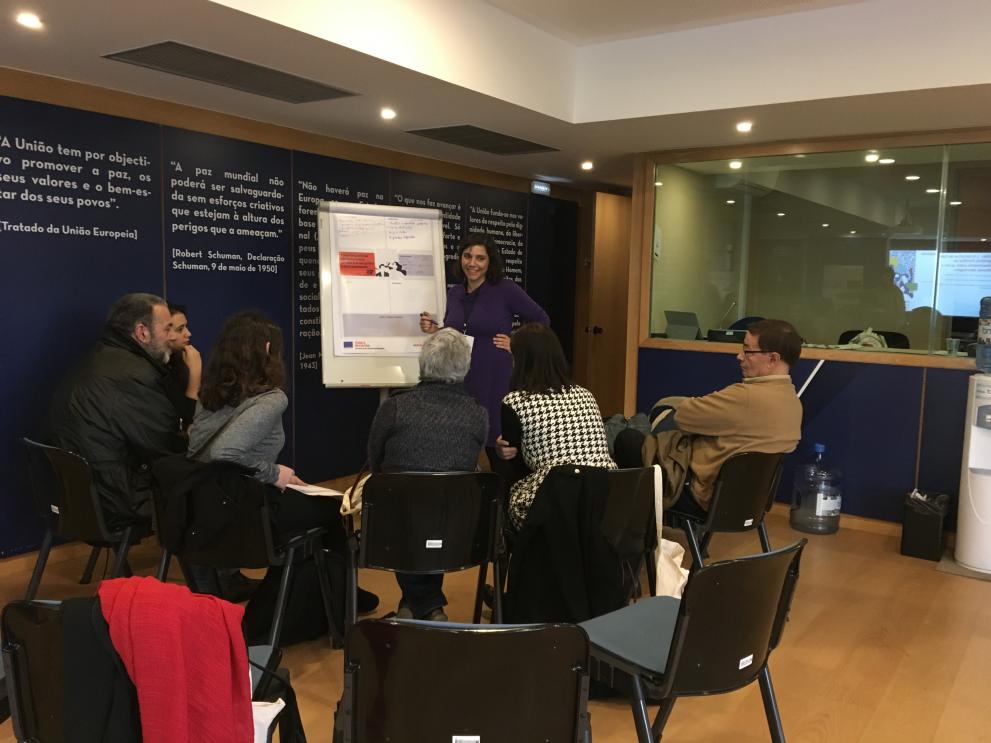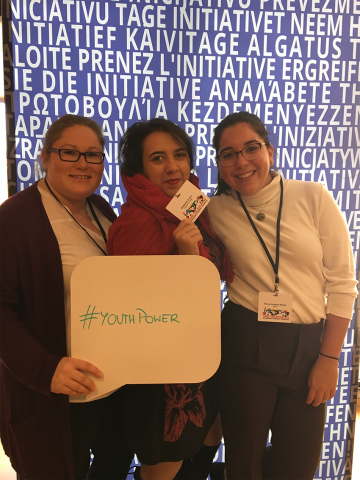
26 November 2018, 13:30 – 17:30 | Workshop @ European Commission Representation in Lisbon, Portugal
The European Citizens’ Initiative visited Portugal as part of the three-year long European Citizens’ Initiative Roadshow, which was launched earlier this year in Bulgaria. Since then the Roadshow has already visited Lithuania, Poland, the Czech Republic and France and will host its final event of the year in Austria.
The European Citizens’ Initiative team was welcomed at the European Commission Representation in Lisbon, for a half-day knowledge-sharing workshop on the European Citizens’ Initiative and how to make pan-European democracy happen. The workshop was an opportunity for civil actors from the Portuguese society to meet and discuss ideas and share experiences on participatory democracy and the European Citizens’ Initiative.
The workshop was divided into three parts; a quiz on the European Citizens’ Initiative, which enabled the participants to test their knowledge of the tool and learn more about it thanks to the presentation of Charlotte Rive, Policy Officer of the European Citizens’ Initiative team at the European Commission, then a panel discussion took place, during which participants asked many questions to the experts and finally three break-out sessions.
Creating a wave of engagement through the European Citizens Initiative
The workshop gathered a panel of 3 experts in the field of participatory democracy and citizen engagement. They shared their experiences of working in these fields as well as the challenges they are currently facing. The workshop was enthusiastically moderated by Regina Quelhas, Director of the Jacques Delors European Information Centre (Eurocid) who helped frame the panel discussion to offer the participants an information-dense workshop.
Charlotte Rive started off the workshop by asking the audience a series of questions on the European Citizens’ Initiative. The audience answered via Slido and were very engaged in the Q&A session that took place after the quiz. Charlotte Rive spoke about the improvements the EU is proposing for the European Citizens’ Initiative in order to make it more use- friendly and encourage more initiatives to be registered
Following the quiz, Regina Quelhas welcomed the other panellists to the table to start the discussion on how to make pan-European democracy happen.
The first panellist to launch the discussion was Joana Dias, Head of Academia Cidada. Joana Dias compared the European Citizens’ Initiative to a wave, which carries positive support to Brussels. She mentioned her experience with the tool and explained that her organisation had already been a partner to the Right2Water and TTIP initiatives.
Joana Dias showcased how local organisations can help spread the message at a local and national level and give initiatives an impulse on their road to success. She highlighted the importance of certain tools such as the power of social media and technology in general. There is no better way nowadays to spread a message at such a large scale. Joana Dias pursued her speech by saying that although initiatives don’t always meet their goals, they still bring attention to an issue that European citizens care about. She ended by saying “If you have an idea then ask for help and make it happen”. Citizens mustn’t rely on others to achieve their goals.
Shooting down the idea that taking part in something doesn’t make a difference
Paula Mendes, President of Associação Mais Cidadania and second panellist to take the stage focused her speech on the youth in Portugal. She explained that today 57% of young Portuguese have no interest in politics and don’t want to take part in democracy because they don’t believe that they can make a change.
Paula Mendes highlighted the importance of better communicating and taking into account the thoughts and ideas of the youth in Portugal and around Europe.
She advocated for the European Citizens’ Initiative by saying that it is tool that creates dialogue about important topics for societies and can create positive and successful impact on citizens. They must not turn away from it by fear of failure. The result here is not the most important, what counts is launching an idea.
Working together to be more inclusive
Isabel Rebelo, Member of Animar, Cooperative SEIES of Setubal and final panelist praised the idea of the European Citizens Initiative, she highlighted the fact that it was a powerful tool to bring citizens together and help them to not feel alone and powerless.
However, she also explained that in our societies today, it is difficult to create engagement when not many citizens are aware of the tools made available or that are simply not interested in their social responsibility.
Despite the above, Isabel Rebelo gave indicators at how to engage, namely to target actors that have a real influence, most often at a local level and who will help spread a powerful message. She indicated that the European Citizens Initiative can trigger an interest in new people, not necessarily engaged up to now and create a new dimension of social engagement.
Sharing ideas and experiences together
Following the panel discussion, the participants took part in breakout sessions. They divided into three groups to discuss and share ideas on different topics including raising funds, promoting an initiative, finding partners.
How to raise funds for your campaign? (Moderator: Isabel Rebelo)
The group found innovative solutions to raise funds for a campaign. One idea was to use technology as a way to better coordinate people and more specifically investors. Organising online meetings and tools can help connect with people more easily and convince them to invest in the campaign. Making things easier for others is a key element in any successful campaign.
The group also mentioned finding private and public funding. It is a better approach to target a wide audience of potential investors in order to increase financing opportunities. They also discussed the possibility of organising corporate philanthropy.
The participants then suggested that organisers should invest in information. Indeed, if the message is clear to others then they are more likely to be attracted and convinced. Also, the group recommended giving the initiative a “wow” factor to really draw attention and attract investors.
Finally, the group emphasized the importance of having a strategy driving the fund raising aspect of the campaign. It is essential to understand where the initiative is going and the goals it wants to reach.
How to look for partners to support your initiative and campaign? (Moderator: Joana Dias)
The group began by laying down the idea that it is first important to gather local support from partners before taking it to the EU level. A suggestion made it to organise a local public consultation to identify whether an interest exists before moving forward.
The next step suggested was to identify an influencer/multiplier for all 7 target countries. Following this, the moderator mentioned finding in the organisers’ networks partners which can multiply the message of the initiative, such partners can be charities, volunteers, professionals, active citizens etc.
The group came up with two ideas to attract partners:
- Talking about social responsibility, where the key is to make people understand that they have a role to play in changing society and that is it their responsibility to take action when they believe in a topic;
- Identifying an incentive; giving partners a reason why they should support an initiative, what’s in it for them can be a way to convince them to get involved and help spread the message.
How to promote your citizens’ initiative? (Moderator: Paula Mendes)
The participants started by indicating that in order to launch a successful initiative it was very important to choose a relevant topic, which can trigger an interest not only locally but also at an EU level. Finding the right topic will attract the attention of more citizens and help promote it across European borders.
They carried on the discussion by pointing out that mapping relevant multipliers would help the promotion of one’s initiative. It is not feasible to only rely on the organisers’ networks to promote the initiative; multipliers must be found in order to increase the outreach.
On top of mapping relevant multipliers, the group suggested using social media as a tool to promote an initiative. This follows the idea of increasing the potential outreach via different channels.
Another key element discussed amongst the participants of the group was the importance of raising awareness; this will help in the promotion of the initiative. However, they pointed out it was necessary to also talk to people that are not on board with the initiative. It can help the promotion to widen the message and to bring the right arguments to people who are opponents to the idea in order to convince them of the good the initiative can bring.
The last point developed by the group to help promote an initiative is to identify influencers and spokespeople to which each category of the population can identify to. Indeed, the group explained that teenagers don’t respond to the same people as professionals do or retired people even. Therefore, it is an idea to find several influencers which will speak to all audience.
- Categories
- Regulatory framework









Leave a comment
To be able to add comments, you need to authenticate or register.Comments